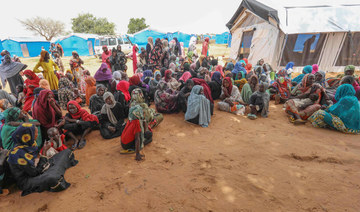NEW YORK CITY: The UN Security Council on Friday voted to end the mandate of the UN mission in Sudan. Fourteen of the council’s 15 members voted in favor of the draft resolution, while Russia abstained.
The resolution asks the UN Integrated Transition Assistance Mission in Sudan to begin winding down its operations and transferring its duties to other UN agencies from Dec. 4. The aim is to complete the transfer by February, where feasible. The mission will then begin to close on March 1.
The Security Council vote took place against the backdrop of a significant increase in violence in Sudan. The war-ravaged nation has been contending with the profound political, security and humanitarian effects of clashes that began on April 15 in and around Khartoum between the Sudanese Armed Forces, led by Gen. Abdel Fattah Al-Burhan, who also chairs the nation’s Transitional Sovereign Council, and the Rapid Support Forces, a rival paramilitary group led by Gen. Mohammed Hamdan Dagalo, commonly known as Hemedti.
The conflict quickly spread from Khartoum to other regions, including Darfur, White Nile, Gezira, and Kordofan states. According to the UN, more 10,000 people in Sudan have lost their lives since the conflict began, and 25 million now require humanitarian assistance to survive. More than 6 million people have been displaced by the fighting, with more a million fleeing to neighboring countries.
The relationship between the UN mission in Sudan and authorities in the country has been strained since the outbreak of the conflict. In May, Al-Burhan wrote to UN Secretary-General Antonio Guterres demanding that Volker Perthes, at the time Guterres’ special representative to Sudan, be replaced. When the UN stood by Perthes, Al-Burhan declared him “persona non grata.” As relations continued to deteriorate, the envoy resigned from his post in September, saying it was impossible for him to carry out his work effectively from outside of Sudan.
Since then, the UN mission in the country has been under the guidance of Clementine Nkweta-Salami, the organization’s deputy special representative for Sudan and its resident and humanitarian coordinator, who is stationed in Port Sudan.
During a Security Council meeting about Sudan last month, the country’s ambassador to the UN, Al-Harith Idriss Al-Harith Mohammed, relayed his nation’s decision to call for the UN mission in Sudan to be closed down. The Sudanese Foreign Ministry said that given the current circumstances, the mission no longer aligns with the desires of the Sudanese people and their government.
Robert Wood, the alternative representative of the US for special political affairs, told the council after the Security Council vote on Friday that while his country had voted in favor of the resolution, to enable “a safe and orderly drawdown of the mission,” Washington remains concerned that a reduced international presence in Sudan “will only serve to embolden the perpetrators of atrocities, with dire consequences for civilians.”
He added: “If anything, the work of UNITAMS is all the more critical considering the ongoing open conflict, atrocities, human rights violations and abuses, calamitous humanitarian situation for tens of millions of Sudanese, and a growing risk of spillover that threatens regional security and stability.”
On Thursday, UN spokesperson Stephane Dujarric said: “What is clear, and what should be clear to everyone, is that the United Nations is not leaving Sudan. We will continue all our efforts aimed at ending the war, at facilitating humanitarian assistance, and at restoring a civilian transition.
“Despite what is going on with the political mission, I think it is very important for people to remember that we have humanitarian colleagues in large numbers who remain present in Sudan, assisting people who are in dire need of humanitarian help.
“So to say that the United Nations is leaving Sudan, I think, is a misreading of the facts.”
























